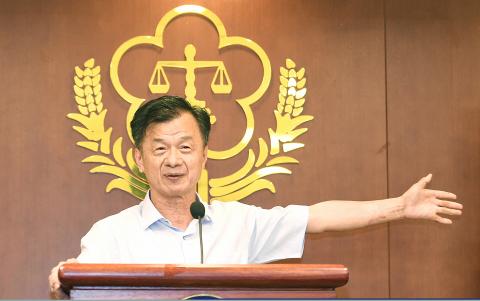Minister of Justice Chiu Tai-san (邱太三) at a news conference in Taipei yesterday likened detractors to “mad dogs barking in the street” as he denied allegations of improper influence to help his wife return to work as a district court judge.
His three accusers must issue public apologies within five days or he would file libel lawsuits, Chiu said, adding that the situation arose because of irresponsible reports that “fabricated most of the information.”
Chiu’s statements came one day after pundits on Taiwan Go, a political talk show produced by Sanlih E-Television, accused Chiu of improper influence in 2011.

Photo: Liu Hsin-de, Taipei Times
Attorney Chou Wu-jung (周武榮) and legal expert Huang Yueh-hung (黃越宏) — who publishes Journal on the Rule of Law (法治時報) — told Taiwan Go host Liao Hsiao-chun (廖筱君) that Sung Fu-mei (宋富美) returned to the judiciary and was made district court judge in Taichung after Sung had resigned as a high-court judge in 2001 to avoid a conflict of interest as Chiu was running for his second term as a Democratic Progressive Party (DPP) lawmaker.
Liao and Huang attended the news conference, sitting at the back of room as Chiu said that the accusations had no factual basis.
“Most of the time, my attitude when dealing with gossip shows and their irresponsible reporting is to treat it like a mad dog barking at you on the street,” Chiu said. “Of course, you do not bark back, but ignore it and walk away.”
“However, on Taiwan Go, they spoke in conjecture and fabricated content, accusing me of improper influence on my wife’s behalf,” he said. “I am quite disappointed. The show was just the pundits making up stories.”
“They did not provide any factual information about what took place, when, where or with who,” he said.
“Therefore I demand that Liao as host of the show, as well as Huang and Chou, issue public apologies regarding their accusations against me,” he said. “If this is not done, I will sue for libel and will also request financial compensation.”
Chiu said that in 2011 he was dean of the law department at Asia University in Taichung and did not hold an important position at DPP headquarters.
“The ruling party was the Chinese Nationalist Party (KMT), and the DPP only had one-quarter of the seats in the legislature. How would it have been possible for me to influence what job my wife was given?” he asked.
Chiu did not answer questions at the news conference.
After Chiu’s departure, Liao spoke to reporters, saying: “It is regretful that the minister did not take questions... If we have done anything wrong, then we welcome a lawsuit, but we wanted to ask if he would be willing to see an investigation into the allegations.”

A Taiwanese software developer has created a generative artificial intelligence (AI) model to help people use AI without exposing sensitive data, project head Huang Chung-hsiao (黃崇校) said yesterday. Huang, a 55-year-old coder leading a US-based team, said that concerns over data privacy and security in popular generative AIs such as ChatGPT and DeepSeek motivated him to develop a personal AI assistant named “Mei.” One of the biggest security flaws with cloud-based algorithms is that users are required to hand over personal information to access the service, giving developers the opportunity to mine user data, he said. For this reason, many government agencies and

The National Fire Agency on Thursday said a series of drills simulating a magnitude 8.5 earthquake would be held in September to enhance the government’s emergency response capabilities. Since earthquakes cannot be predicted, only by continuously promoting disaster prevention measures could Taiwan enhance its resilience to earthquakes, agency Director-General Hsiao Huan-chang (蕭煥章) said in a news release. The exercises would be held to mark annual National Disaster Prevention Day on Sept. 21, the aim of which is to test Taiwan’s preparedness and improve its earthquake resilience in case of a major temblor, Hsiao said. As part of those drills, an earthquake alert would

DEFENSE: The National Security Bureau promised to expand communication and intelligence cooperation with global partners and enhance its strategic analytical skills China has not only increased military exercises and “gray zone” tactics against Taiwan this year, but also continues to recruit military personnel for espionage, the National Security Bureau (NSB) said yesterday in a report to the Legislative Yuan. The bureau submitted the report ahead of NSB Director-General Tsai Ming-yen’s (蔡明彥) appearance before the Foreign and National Defense Committee today. Last year, the Chinese People’s Liberation Army (PLA) conducted “Joint Sword-2024A and B” military exercises targeting Taiwan and carried out 40 combat readiness patrols, the bureau said. In addition, Chinese military aircraft entered Taiwan’s airspace 3,070 times last year, up about

STRICTER ENFORCEMENT: Taipei authorities warned against drunk cycling after a sharp rise in riding under the influence, urging greater public awareness of its illegality Taipei authorities have issued a public warning urging people not to ride bicycles after consuming alcohol, following a sharp rise in riding under the influence (DUI) cases involving bicycles. Five hundred and seven people were charged with DUI last year while riding YouBikes, personal bicycles, or other self-propelled two-wheelers — a fourfold increase from the previous year, data released by the Taipei Police Department’s Traffic Division showed. Of these, 33 cases were considered severe enough to be prosecuted under “offenses against public safety,” the data showed. Under the Road Traffic Management and Penalty Act (道路交通管理處罰條例), bicycles — including YouBikes and other